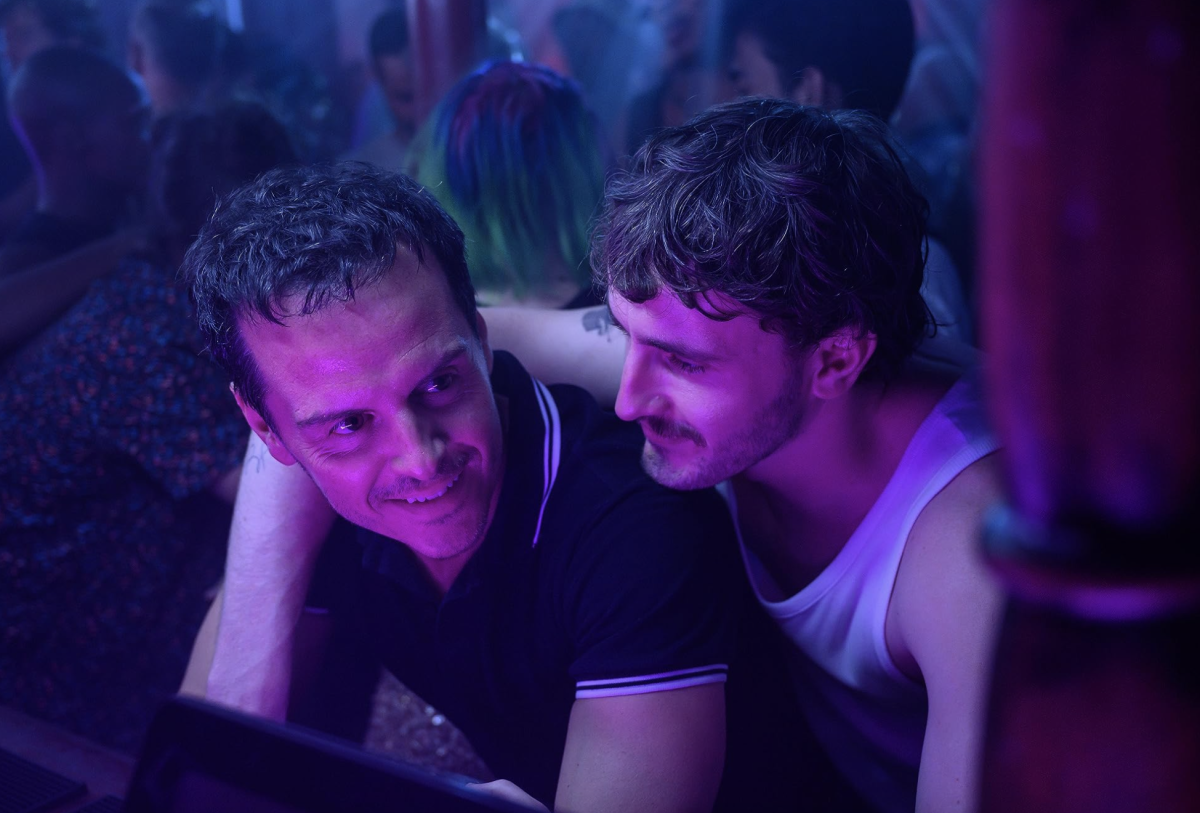Andrew Haigh’s latest film is a prime example of filmmaking as a form of therapy. “All of Us Strangers” follows Adam (Andrew Scott), a solitary screenwriter who quite literally visits the home of his childhood, reconnecting with the ghosts of his long-dead parents in the process. Between these visits, he forms an intimate romance with Harry (Paul Mescal), a fellow inhabitant of his seemingly desolate London apartment building. The film is both deeply sensitive and strangely distant, struggling to balance its protagonist’s cathartic time travel journey with the deftly-realized romance at its center.
The film is based in part on Taichi Yamada’s 1987 novel, “Strangers,” which follows a similar encounter with a writer’s deceased parents. The film retains a certain literary patience, allowing dialogue-forward scenes to unfold in long takes. Jamie D. Ramsay’s shallow-focus, richly colored cinematography lends the whole production a dreamy feeling, as if the world stops beyond the set of each scene.
The greatest strengths of “All of Us Strangers” are what you might expect from a Haigh film, whose previous credits include the remarkably authentic gay romance “Weekend” and the Oscar-nominated septuagenarian marriage drama “45 Years.” In each project, he excels at bringing forward hyper-specific details of emotional intimacy, both romantic and familial.
The moments shared between Adam and Harry are truly stunning to watch. From their first awkward meeting, in which Harry is drunk, you can detect nearly every aspect of the relationship that will build throughout the film. Scott’s measured performance wavers between undeniable physical attraction and serious discomfort with Harry’s state. Mescal plays both the swaggering confidence and the subliminal self-consciousness that will go on to define the rest of their time together.
The same eye for performance can be seen in the scenes with Adam’s parents, played by Claire Foy and Jamie Bell. With each reunion they greet their son — now older than they ever were — with open arms, wanting to know about his life as if he had only been gone for a couple of months. Foy’s performance upon hearing Adam’s coming out is almost unbearably realistic. In her eyes and body language is a world of conflict, attempting to balance her love for him with a deep-seated discomfort with his sexuality. It’s a heartbreaking setup, giving Adam the opportunity to divulge everything he could not say to them before they were killed in a car accident. Where “All of Us Strangers” falls short is its purely theoretical approach to these conversations.
Each time Adam visits his parents, he brings up something left behind from his childhood. It is a logical approach to this story, as queer adults are often tasked with unpacking the traumas of their childhood, effectively “healing your inner child.” Unfortunately, it makes these segments of the film feel more like a therapy session for a character we only vaguely know, and less like an engaging drama with fully developed characters.
The film’s most effective moments are the ones shared between Adam and Harry. As in “Weekend,” Haigh shoots Adam and Harry’s multiple sex scenes with the precision of any other dialogue scene, tracking the journey from foreign desire to total physical familiarity with confidence. With an influx of apprehension toward sex scenes among younger film fans, “All of Us Strangers” shows how much a sex scene can tell us about a character, and even more so how one can demonstrate an advancement in the relationship between two characters.
Haigh’s decision to include deliberately explicit details of gay sex also beautifully reflects the film’s larger theme of accepting all aspects of one’s queerness and one’s self as a whole. In these scenes, there is no shame for either character’s proclivities, as there is nothing to be ashamed of.
“All of Us Strangers” is a frustrating watch. In theory, it is a stroke of genius to marry the ghost story to a queer person’s search for inner peace. Great ghost stories like “The Ghost and Mrs. Muir” and “The Innocents” interrogate how the lost loves and unexamined scars of the past inform our current identity. Queer identity often has a basis in trauma, forcing those affected to face it head-on to live a confident life. Haigh also called a ghost story a way to explore the lives of those lost during the AIDS crisis during the 1980s and 90s. Unfortunately, the final film doesn’t quite draw the two stories together enough to live up to the concept.
Thomas Machacz can be reached at [email protected].





















Tisha • Feb 12, 2024 at 6:01 pm
What a great review. It’s very thoughtful and informative. Thanks!